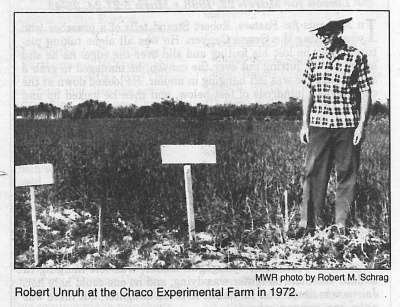If this site was useful to you, we'd be happy for a small donation. Be sure to enter "MLA donation" in the Comments box.
Unruh, Robert G. (1922-1998): Difference between revisions
No edit summary |
No edit summary |
||
| Line 26: | Line 26: | ||
His advice led to agricultural innovations that transformed the Chaco. He introduced buffel grass, which displaced the bitter native grass and offered nutrition that fattened cattle for market in 18 months instead of four years. He crossbred Holstein cows with rugged, long-horned bush cattle to produce hybrids adapted to the Chaco. A dairy industry was born that today produces 65 percent of all the milk products in Paraguay. | His advice led to agricultural innovations that transformed the Chaco. He introduced buffel grass, which displaced the bitter native grass and offered nutrition that fattened cattle for market in 18 months instead of four years. He crossbred Holstein cows with rugged, long-horned bush cattle to produce hybrids adapted to the Chaco. A dairy industry was born that today produces 65 percent of all the milk products in Paraguay. | ||
[[Image:Unruh_robert_g_1998.jpg| | [[Image:Unruh_robert_g_1998.jpg|400px|right]] | ||
Unruh was born April 26, 1921, to Anthony H. and Anna Albrecht Unruh of Bloomfield, Mont. He attended Bethel College in North Newton and earned a master’s degree in agricultural education from Texas A&M University. He married Myrtle Goering on June 3, 1949. | Unruh was born April 26, 1921, to Anthony H. and Anna Albrecht Unruh of Bloomfield, Mont. He attended Bethel College in North Newton and earned a master’s degree in agricultural education from Texas A&M University. He married Myrtle Goering on June 3, 1949. | ||
Latest revision as of 10:13, 21 September 2010
Mennonite Weekly Review obituary: 1998 Mar 12 p. 6
Birth date: 1922
text of obituary:
MCCer Led Chaco Transformation
Unruh, Who Served 32 Years in Paraguay, Dies at 76 in Kansas
By Paul Schrag Editor
NEWTON, Kan. — Robert G. Unruh witnessed the transformation of Mennonite life in the Paraguayan Chaco. He also helped make it possible.
“And he did it in such a quiet, unassuming way,” said J. Winfield Fretz of North Newton. “He was a delightful representative of North America Mennonites to the people down south. He was really a model missionary.”
Unruh, a Mennonite Central Committee worker in Paraguay for 32 years who played a key role in revolutionizing the agriculture and economy of the Paraguayan Chaco, died March 5 at his daughter’s home in rural Newton. He was 76.
When Unruh and his wife, Myrtle, arrived in the Chaco in 1951, the Mennonite colonists’ way of life was primitive. When they left in 1983, it was prosperous.
“We feel very privileged to have worked with Bob Unruh,” said Marie Wiens of Hillsboro, whose husband, Frank, directed MCC programs in Paraguay in the 1950s and ‘60s. “He was a giant among his people . . . and he was a humble servant.”
Frank Wiens added: “He was trusted. People went to him morning, noon and night for advice.”
His advice led to agricultural innovations that transformed the Chaco. He introduced buffel grass, which displaced the bitter native grass and offered nutrition that fattened cattle for market in 18 months instead of four years. He crossbred Holstein cows with rugged, long-horned bush cattle to produce hybrids adapted to the Chaco. A dairy industry was born that today produces 65 percent of all the milk products in Paraguay.

Unruh was born April 26, 1921, to Anthony H. and Anna Albrecht Unruh of Bloomfield, Mont. He attended Bethel College in North Newton and earned a master’s degree in agricultural education from Texas A&M University. He married Myrtle Goering on June 3, 1949.
In 1951 they arrived in Paraguay, traveling the last seven-hour leg of their journey by horse-pulled wagon through the wilderness to Filadelfia, which was to be their home for the next 32 years.
In a harsh and forbidding environment, the Unruhs set to work. Bob took charge of MCC’s new experimental farm, with an annual budget of $500. Myrtle taught home economics, led women’s groups and conducted radio programs.
Unruh introduced improved strains of peanuts, castor beans, safflower and sesame. He found insecticides and repellents to cope with plant and animal diseases. He established a nursery that supplied orchard and residential trees.
“Particularly close to his heart,” said historian Robert Kreider in a tribute at the memorial service, “was his work among Indian neighbors, recently nomads of the bush, now learning the ways of farming, schooling and Christian peoplehood. This, a missionary miracle in the Chaco that really transcends the economic miracle.”
The Unruhs retired to Newton in 1983. Myrtle died Sept. 23, 1996.
Last spring, Unruh returned to the Chaco, where Gov. Cornelius Sawatsky presented him with an award and said: “You had faith in people when they did not have faith in themselves. If one way didn’t work, you tried another way, then another. You never gave up on any one or anything.”
Unruh was a member of Eden Mennonite church at Moundridge, where a memorial service was held March 9.
He is survived by a daughter, Elizabeth Leite of Newton; five brothers, Willard of North Newton, Verney of Newton, Leslie of Bloomfield, Mont., Jim of Racine, Ohio; and Gerald of Billings, Mont.; four sisters, Helen Buller of North Newton, Evelyn Klein of Langdon, N.D. Betty Knorr of Salt Lake City, Utah, and Phyllis Lobdell of Sun River, Mont.; and four grandchildren.
Mennonite Weekly Review obituary: 23 April 1998 p. 9
KANSAS
MOUNDRIDGE
Eden Mennonite Church
Robert G. Unruh, 76, died March 5. Survivors: daughter, Betty Leite, four grandchildren.
— Marjorie Stucky